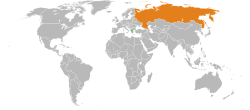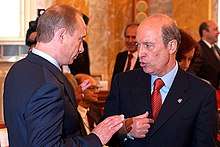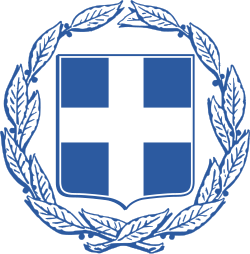Greece–Russia relations
Greece–Russia relations refers to the bilateral relationship between Greece and Russia and their predecessor states. Diplomatic relations between the Russian Empire and the Greek state were established in September 1828.[1] Both Greece and Russia are full members of some international organizations, including the Council of Europe, the Organization for Security and Co-operation in Europe and the Organization of the Black Sea Economic Cooperation. Despite Greece being member of NATO and the European Union, their relationship has been notably strong.
 | |
Greece |
Russia |
|---|---|
Greece has an Embassy in Moscow, and three Consulates General: in Moscow,[2] in Saint Petersburg and in Novorossiysk. Russia has an embassy in Athens, and a Consulate General in Thessaloniki.[3]
History
Background
Pontic Greeks historically inhabited the northern coast of the Black Sea and Crimea, which were incorporated in the Russian Empire in the latter half of the 18th century.
Russia assisted the Greeks against the Ottoman rule prior to and during the Greek War of Independence that broke out in 1821. Ioannis Kapodistrias, the first Governor of the First Hellenic Republic, had previously served as Russia′s foreign minister. The Russian Empire established diplomatic ties with the Greek State on 6 [N.S. 18] September 1828.[4]
The second queen of modern Greece was born Grand Duchess Olga Constantinovna of Russia, granddaughter of Tsar Nicholas I.
The Kingdom of Greece and the Russian Empire fought on the same side during WWI against the Central Powers, and again later, during WWII (as Soviet Union), against the Axis.
From autumn of 1920, Soviet Russia, having concluded the friendship treaty with the Government of the Grand National Assembly in March 1921, went on to extend material assistance, both in gold and arms, to the Kemalist regime in Ankara, thus significantly contributing to the Kemalists′ military success in the war against the Greeks in Asia Minor,[5] where the genocide of native Greeks was completed as a result in 1922.
The USSR and the Kingdom of Greece established diplomatic relations on 8 March 1924.[4] Official relations were frosty in the 1930s, especially under the staunchly anti-Communist authoritarian regime of Greek prime minister Ioannis Metaxas. The Percentages agreement struck by Joseph Stalin and Winston Churchill in Moscow in October 1944, which placed Greece firmly in the UK′s spheres of influence, led to the Soviet Union′s non-interference in support of the communist uprising in Athens in December 1944 that was crushed with the UK′s backing as well as to Stalin′s reluctance to render tangible assistance to the Greek Communists during the Civil War that they lost in October 1949.[6][7]
Most of the ethnic Greeks resident in Crimea as well as other regions near the Black Sea in the USSR were deported to eastern parts of the country in three waves of forced resettlement carried out in the 1940s. A significant number of Soviet Greeks, especially those resident in the Kazakh Soviet Socialist Republic and other Central Asian Soviet republics, emigrated to Greece in the late 1980s and early 1990s, shortly prior to the dissolution of the USSR.[8]
According to Western intelligence officials, Greece′s society and political establishment have been deeply penetrated by the USSR′s and later Russia′s espionage agencies.[9]
Diplomatic spat of 2018
In early July 2018, the government of Greece expelled two Russian diplomats and barred the entry of two others accusing them of undermining national security of Greece. The move was made public, which was seen by experts as unprecedented in the two countries′ relations.[10][11][12] Amidst the subsequent acrimonious exchange of official statements, Greece accused the Russian foreign ministry of "disrespect for a third country and a lack of understanding of today’s world, in which states, regardless of their size, are independent and can exercise an independent, multidimensional and democratic foreign policy".[13] Following Russia′s retaliatory move in early August, it was revealed Greece intended to recall its ambassador, Andreas Fryganas, who had been appointed in May 2016.[14][15][16][17]
The Greek foreign ministry′s statement of 10 August 2018 said: ″Since [Russia] began fighting as a comrade in arms with Turkey, providing it with a number of facilitations in the security sector, it appears to be steadily distancing itself from positions befitting the level of friendship and cooperation that has characterized Greek-Russian relations for the past 190 years. It appears not to understand that Greece has its own interests and criteria in international politics.″[18] The statement accused Russia of ″attempts to a) bribe state officials, b) undermine its foreign policy, and c) interfere in its internal affairs.″[18]
On 7 December 2018, Greek prime minister Alexis Tsipras went to Russia on a working visit, his first visit to Russia in three years.[19] After talks he had with Vladimir Putin, both leaders expressed hope that the spat between the two countries was in the past; bilateral agreements were signed, international issues such as the Cyprus dispute were discussed.[20][21][22][23] Alexis Tsipras said he had expressed to Putin his concern at Turkey buying advanced weapons, such as S-400 missile systems, from Russia.[24][25] Experts noted that Greece—Russia relations were not as they had been prior to the spat pointing to the growing importance of Greece′s strategic military ties with the U.S. in the situation where military cooperation between Russia and Turkey was in the ascendant.[26] On 13 December 2018, in Washington, D.C. Greece′ and the U.S.′ foreign ministers formally launched what they called "the inaugural U.S.-Greece Strategic Dialogue",[27][28] which Greek acting foreign minister Georgios Katrougalos characterised as ″a procedure that shows the upgrading of our relations with that country″[29] and ″the apex of our bilateral relations″.[30]
The Prespa agreement
Russia has been accused by Greece and other parties of having sought to thwart the Prespa agreement reached in June 2018 between Greece and the Republic of Macedonia meant to resolve the dispute over the latter's name and seen as removing the main obstacle for Macedonia’s accession to NATO.[31]
On 14 January 2019, Russia′s foreign ministry issued a commentary that referred to the agreement as the "Prespa deal" and stated that the decision by the parliament of Macedonia to change the country’s name had been imposed from outside and did not reflect the will of the people and came "with an aim of pulling Skopje into NATO as soon as possible"; the statement went on to cite "the recent developments in Greece — withdrawal from the government coalition of the Independent Greeks Party leader, Panos Kammenos, coming out against the Prespa accord" as evidence that stability and security in the Balkans was thus being undermined; the ministry suggested that "the issue must be considered by the UN Security Council in accordance with Article 3 of UN Security Council Resolution 845".[32][33] The Russian foreign ministry′s statement on the Prespa agreement was condemned by Greece whose official statement concluded by saying as follows: "We express our certitude that Russia, which has for years recognized fYRoM as the 'Republic of Macedonia' will respect the sensibilities of the Greek people in using the name Macedonia and will henceforth refer to this country with its new constitutional name, i.e. 'North Macedonia', and most importantly that it will refrain from such statements, which constitute an intervention in Greece’s interior affairs."[34][35][36]
Military cooperation

Greece is one of the few pre-1990 NATO member countries (alongside Germany for a time) that makes extensive use of Russian weapons. Greece first received many Soviet-era surplus weapons, such as BMP-1 armoured fighting vehicles, RM-70 rocket launchers, ZU-23-2 anti-aircraft guns and SA-8 anti-aircraft missile systems from the former East German National People's Army inventory in the early 1990s. Since then, Greece has additionally procured the TOR M-1 and S-300 anti-aircraft missile systems (the latter originally destined for Cyprus), the Kornet-E anti-tank missile, AK-74M assault rifles and ZUBR hovercrafts. The militaries of both countries also participate in programmes of military cooperation in the Aegean Sea and the Eastern Mediterranean Sea, as well as giving military support and training to countries that they have close relations with, such as Armenia, with Greece often accepting Armenian military officials in the Hellenic Military Academy.
Economic relations
Burgas-Alexandroupoli pipeline
The Burgas-Alexandroupoli pipeline was proposed in 1993–1994 by several Russian and Greek companies.[37] In 1994, for construction of the pipeline Greece and Bulgaria signed a bilateral agreement, followed by a memorandum of cooperation, signed by Greece and Russia.[38]
In February 1998, a Greek consortium for pipeline construction named Bapline was established, and in May 1998, a memorandum of creation of the Transbalkan Oil Pipeline Company was signed.[38] In 2000, a technical specifications and an economic evaluation of the project were prepared by the German company ILF.[37] A joint protocol for preparing the pipeline's construction was signed by the three countries in January 2005.[39]
The political memorandum between both governments was signed on 12 April 2005. An inter-governmental agreement on the project was agreed on 7 February 2007, and it was signed on 15 March 2007 in Athens, by the involved ministers of the three countries, under the presence of their leaders, Vladimir Putin (Russian president), Sergei Stanishev (Bulgarian prime-minister), and Kostas Karamanlis (prime-minister of Greece).[40][41]
The agreement establishing the international project company was signed in Moscow on 18 December 2007 and the company, called Trans-Balkan Pipeline B.V., was incorporated in the Netherlands on 6 February 2008.[42][43] Construction of the pipeline was scheduled to start in October 2009, and was estimated to be completed by 2011.[44] In 2011, the project was definitively terminated.
Trade
Since 2014, mutual trade between the countries has been in steady decline.[45]
Religious and cultural ties, mutual perceptions
Religious ties between the two nations with majorities of both countries adhering to the Eastern Orthodox Church, have played a major role in fostering bilateral relations. Since its formation in 1994, the Athens-based Interparliamentary Assembly on Orthodoxy has become a relevant institution in promoting exchange and cooperation.
According to a Pew Research Center opinion poll taken in 2017, 64% of Greeks view Russia favorably versus 31% expressing a negative opinion.[46] 50% of Greeks had confidence in Russia′s president Vladimir Putin when it came to international affairs, the only European Union country surveyed that had confidence in the Russian leader.[47]
Agreements
The following agreements are in place:[1]
- Friendship and Cooperation Agreement (1993)
- Agreement on Economic, Industrial, Technological, and Scientific Cooperation (1993)
See also
| Wikimedia Commons has media related to Relations of Greece and Russia. |
- Foreign relations of Greece
- Foreign relations of Russia
- Greeks in Russia
- Russians in Greece
References
- "Bilateral relations between Russia and Greece". Greek Ministry of Foreign Affairs. Retrieved 2009-06-18.
- Генеральное Консульство в Москве
- Генеральное консульство России в Салониках
- Межгосударственные отношения России и Греции. Справка
- «Международная жизнь», 1963, № 11, p. 148.
- Nachmani, Amikam; Nachmani, Professor in the Department of Political Studies Amikam (1990). International Intervention in the Greek Civil War: The United Nations Special Committee on the Balkans, 1947-1952. Greenwood Publishing Group. pp. 3–5. ISBN 9780275933678.
- David Carlton. Churchill and the Soviet Union (Manchester University Press, 2000), p. 120.
- Panagoula Diamanti-Karanou, "Migration of ethnic Greeks from the former Soviet Union to Greece, 1990-2000: Policy decisions and implications." Southeast European and Black Sea Studies 3.1 (2003): 25-45.
- Is Putin Playing Puppetmaster in Greece? The Daily Beast, 7 August 2015.
- Греция показала свое истинное отношение к России vz.ru, 11 июля 2018.
- Greece, Russia to expel diplomats in Macedonia tussle ahead of NATO summit Reuters, 11 июля 2018.
- Greece 'orders expulsion of two Russian diplomats' BBC, 11 July 2018.
- Ministry of Foreign Affairs announcement on statements from the spokesperson of the Russian Ministry of Foreign Affairs The Ministry of Foreign Affairs of the Hellenic Republic, 18 July 2018.
- Greece recalls envoy from Russia in worsening spat Vatican News, 11 August 2018.
- Russia expels Greek diplomats in retaliatory move Reuters, 6 August 2018.
- Греция отзывает посла из Москвы и заменит его новым - источник Nezavisimaya Gazeta, 10 August 2018.
- Источник: посол Греции в РФ покинет Москву в конце сентября TASS, 15 August 2018.
- Putting national interest first: Soberly and firmly. The Ministry of Foreign Affairs of the Hellenic Republic, 10 August 2018.
- Российско-греческие переговоры kremlin.ru, 7 December 2018.
- GCT (2018-12-06). "Alexis Tsipras off to Moscow to meet Putin". Greek City Times. Retrieved 2018-12-21.
- Zabelin, Sergey. "Russia and Greece: Results of the Putin-Tsipras Meeting in Moscow on December 7, 2018". Valdai Club. Retrieved 2018-12-21.
- Us, Contact; Advertisement; Disclaimer; Scholarship; Policy, Privacy; Us, About; UrduPoint; News, Urdu; Live TV, Mobile Prices. "Roscosmos, Greek Space Agency To Sign Cooperation Deal During Tsipras Visit - Official". Pakistan Point. Retrieved 2018-12-21.
- "Tsipras, Putin see eye to eye on energy, diverge on geopolitics, Vassilis Nedos | Kathimerini". www.ekathimerini.com. Retrieved 2018-12-21.
- Greece's Tsipras tells Russia he's concerned by Turkish arms purchases. Reuters, 7 December 2018.
- Ципрас сообщил Путину, что обеспокоен в связи с закупкой Турцией российских вооружений. TASS, 7 December 2018.
- Эксперт: Путин и Ципрас провели самую важную встречу с 2015 года. Rossiyskaya Gazeta, 8 December 2018.
- Joint Statement Regarding the Inaugural United States-Greece Strategic Dialogue. U.S. Embassy in Greece, 13 December 2018.
- Joint Statement Regarding the Inaugural United States-Greece Strategic Dialogue. The Ministry of Foreign Affairs of the Hellenic Republic, 14 December 2018.
- Alternate Minister of Foreign Affairs Giorgos Katrougalos’ Interview on “Thema Radio” with journalists M. Pollatos and I. Makrygiannis. The Ministry of Foreign Affairs of the Hellenic Republic, 11 December 2018.
- Alternate Minister of Foreign Affairs G. Katrougalos’ interview with the “Washington Times”. The Ministry of Foreign Affairs of the Hellenic Republic, 18 December 2018.
- Russia accused of trying to undermine Macedonia name deal. European Western Balkans, 13 August 2018.
- Decision to rename Macedonia doesn’t reflect people’s will, Moscow says. TASS, 14 January 2019.
- Комментарий Департамента информации и печати МИД России в связи с принятием Собранием Республики Македонии поправок в конституцию. mid.ru, 14 January 2019.
- Ministry of Foreign Affairs announcement on today’s announcement by the Russian Ministry of Foreign Affairs on the Prespa Agreement. The Ministry of Foreign Affairs of the Hellenic Republic, 14 January 2019.
- Greek Foreign Ministry: Russia undermines Prespes peace deal. Kathimerini, 15 January 2019.
- МИД Греции призвал РФ не вмешиваться в ее внутренние дела из-за Преспанского соглашения. TASS, 14 January 2019.
- "Burgas-Alexandrupolis Pipeline Project". Transneft. Archived from the original on 2006-10-04. Retrieved 2007-02-15.
- Peggy Papakosta. "Everybody wins". Bridge Magazine. Archived from the original on 2007-09-28. Retrieved 2007-02-15.
- "Greece, Russia, Bulgaria move closer to building Burgas-Alexandroupoli pipeline". Embassy of Greece to the United States. 2005-01-29. Archived from the original on 2007-03-11. Retrieved 2006-05-07.
- "Bulgaria, Greece, Russia finalize details on long-awaited pipeline deal". Associated Press. 2007-02-06. Archived from the original on 2008-03-06. Retrieved 2008-02-24.
- "Burgas-Alexandroupolis project getting underway, but many questions remain". RBC Daily. 2007-02-08. Retrieved 2007-02-15.
- "Russian President Vladimir Putin in Greece next week for pipeline deal". Athens News Agency. March 7, 2007. Archived from the original on June 5, 2011. Retrieved 2009-06-19.
Russian President Vladimir Putin will be visiting Greece on March 15 to participate in a Russo-Bulgarian-Greek conference, after visiting Italy on March 13–14 for a Russo-Italian conference, the Kremlin announced late on Tuesday, according to a dispatch by the Agence France Press (AFP) agency.
- "Trans-Balkan partners form operator". Upstream Online. NHST Media Group. 2007-12-18. Retrieved 2007-12-19.
- "Trans-Balkan Oil Pipeline Hit By Delays". Downstream Today. 2008-10-17. Retrieved 2009-03-15.
- По святым местам: Что ввело Путина во гнев перед паломничеством на Афон Lenga.ru, 28 May 2016.
- "Opinion of Russia". Pew Research Center.
- "U.S. IMAGE SUFFERS AS PUBLICS AROUND WORLD QUESTION TRUMP'S LEADERSHIP". Pew Research Center.
Further reading
- Averoff-Tossizza, Evangelos. By Fire and Axe: The Communist Party and the Civil War in Greece, (1944-1949) (1978).
- Chambers, Conall. "Halting the Iron Curtain at the Mediterranean: The Greek Civil War and the Origins of the Truman Doctrine." (2016). Online
- Frary, Lucien J. "Russian interests in nineteenth-century Thessaloniki." Mediterranean Historical Review 23.1 (2008): 15-33.
- Frary, Lucien J. Russia and the making of modern Greek identity, 1821-1844 (2015). online review
- Gerolymatos, André. The Balkan Wars: Conquest, retribution and rebellion from the Ottoman Era to the Twentieth Century and beyond. (2002).
- Kuniholm, B.R. The Origins of the Cold War in the Near East: Great Power Conflict and Diplomacy in Iran, Turkey, and Greece (1980),
- Nachmani, Amikam. "Civil War and Foreign Intervention in Greece: 1946-49." Journal of Contemporary History 25.4 (1990): 489-522.
- Prousis, Theophilus Christopher. Russian Society and the Greek Revolution (1994) on the 1820s
- Roberts, Geoffrey. "Moscow’s Cold War on the Periphery: Soviet Policy in Greece, Iran, and Turkey, 1943—8." Journal of Contemporary History 46.1 (2011): 58-81. online
- Ulunian, Artiom A. "Soviet Cold War Perceptions of Turkey and Greece, 1945-58." Cold War History 3.2 (2003): 35-52.

